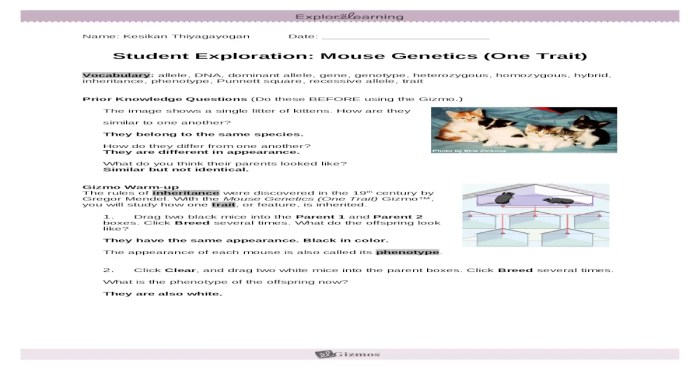Embark on a captivating journey into the realm of DNA mutations with our comprehensive DNA Mutations Worksheet Answer Key. Delve into the fascinating world of genetic alterations, unraveling their causes, consequences, and impact on cellular processes and human health.
Prepare to grasp the intricacies of DNA mutations, from their diverse types to their profound implications in research and clinical settings. Our meticulously crafted worksheet and answer key provide a hands-on approach to understanding these genetic variations, empowering you with the knowledge to decipher the language of DNA.
DNA Mutations: Dna Mutations Worksheet Answer Key

DNA mutations are changes in the DNA sequence of an organism. They can range from small changes in a single nucleotide to large changes that involve the deletion or insertion of entire genes.
Types of DNA Mutations
- Substitution:A substitution mutation is a change in a single nucleotide base pair. For example, a substitution mutation could change the nucleotide sequence from ATCG to ATGC.
- Insertion:An insertion mutation is the addition of one or more nucleotides to the DNA sequence. For example, an insertion mutation could change the nucleotide sequence from ATCG to ATCGA.
- Deletion:A deletion mutation is the removal of one or more nucleotides from the DNA sequence. For example, a deletion mutation could change the nucleotide sequence from ATCG to ATC.
- Inversion:An inversion mutation is a reversal of the orientation of a segment of DNA. For example, an inversion mutation could change the nucleotide sequence from ATCG to CGAT.
Impact of DNA Mutations, Dna mutations worksheet answer key
DNA mutations can have a wide range of effects on gene function and cellular processes. Some mutations are silent and have no effect on the organism, while others can be harmful and lead to disease. Harmful mutations can disrupt the function of proteins, alter gene expression, or cause chromosomal abnormalities.
DNA Mutation Analysis
DNA mutation analysis is the process of identifying and characterizing DNA mutations. This can be done using a variety of techniques, including DNA sequencing and PCR. DNA sequencing is the process of determining the exact order of nucleotides in a DNA molecule.
PCR is a technique that can be used to amplify a specific region of DNA, making it easier to study.
Answers to Common Questions
What are the main types of DNA mutations?
DNA mutations encompass various types, including substitution, insertion, deletion, and inversion, each altering the genetic code in unique ways.
How do DNA mutations affect gene function?
DNA mutations can disrupt gene function by altering the sequence of nucleotides, potentially leading to changes in protein structure and function.
What techniques are used to analyze DNA mutations?
DNA sequencing and PCR (polymerase chain reaction) are widely used techniques for analyzing DNA mutations, providing precise identification and characterization of genetic variations.

